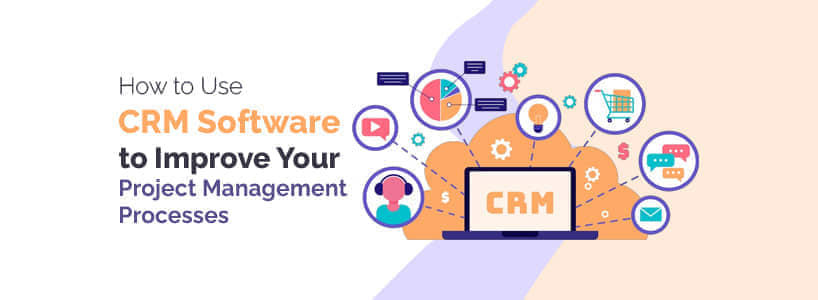How to Use CRM Software to Improve Your Project Management Processes

Juggling multiple projects, keeping track of deadlines, and ensuring seamless communication across teams project management can be a complex endeavor. But what if there was a tool that could streamline these processes and boost your project success rate? Enter Customer Relationship Management (CRM) software.
While traditionally associated with sales and marketing, CRM software offers a treasure trove of features that can significantly enhance your project management approach. Here's how:
1. Centralized Information Hub
CRM software acts as a central repository for all project-related information. Documents, communication threads, client details, and task assignments can all be housed in one secure location. This eliminates the need for scattered spreadsheets, emails, and endless version control battles. Team members have instant access to the latest information, fostering transparency and reducing confusion.
2. Streamlined Task Management
Most CRM platforms offer robust task management functionalities. You can create tasks, assign them to specific team members, set deadlines, and track progress in real-time. This creates a clear picture of project workflows, allowing you to identify potential bottlenecks and adjust resources accordingly. Additionally, features like task dependencies ensure tasks are completed in the correct order, preventing delays.
3. Enhanced Collaboration and Communication
Project success hinges on effective collaboration. CRM software facilitates seamless communication between team members and clients. Internal discussions, client feedback, and project updates can all be consolidated within the CRM platform. This eliminates the need for endless email chains and fosters a collaborative environment where everyone is on the same page.
4. Improved Customer Relationship Management
Let's not forget the "C" in CRM Customer Relationship Management. CRM software allows you to track client interactions, preferences, and feedback throughout the project lifecycle. This valuable data can be used to manage client expectations, address concerns proactively, and deliver projects that truly meet their needs.
5. Data-Driven Decision Making
CRM software generates insightful reports and dashboards that provide a clear picture of project health. You can track key metrics like budget allocation, resource utilization, and project milestones. This data empowers you to make informed decisions about resource allocation, identify potential risks, and adjust project plans as needed.
Putting it into Action: Leveraging CRM Features for Project Success
Here are some practical tips to maximize the benefits of CRM software in project management:
- Customize project pipelines: Tailor the CRM pipeline to visualize your specific project stages and workflows.
- Utilize document management tools: Store and share project-related documents securely within the CRM platform.
- Leverage communication features: Utilize internal chat functionalities and client portals to keep everyone informed.
- Set automated reminders: Automate deadline notifications and task assignments to ensure everyone stays on track.
- Generate reports regularly: Utilize reports to track project progress, identify areas for improvement, and measure project success.
Unlocking the Power of CRM for Project Management
By implementing CRM software and utilizing its features effectively, you can transform your project management approach. Improved organization, enhanced collaboration, and data-driven decision making can lead to increased project success rates, happier clients, and a more efficient workflow. So, ditch the scattered spreadsheets and embrace the power of CRM for a smoother project management journey
-
28 June, 2024 at 12:06 amThis was a really interesting read. I’ll definitely be coming back for more
-
24 June, 2024 at 2:44 amA great post, as always! I appreciate your wisdom.
-
07 June, 2024 at 3:07 pmI appreciate the effort you put into this. Well done!
Add a Comment
Your email address will not be published. Required fields are marked *
Categories
Popular Posts
![Top 7 Reasons Schools Should Automate Their Operations in 2026 [thumb]](https://blogimages.weblink.in/top-7-reasons-schools-should-automate-their-operations-in-2026-350x128.jpg)
Top 7 Reasons Schools Should Automate Their Operations in 2026
![How School ERP Solutions Improve School Administration Efficiency? [thumb]](https://blogimages.weblink.in/how-school-erp-solutions-improve-school-administration-efficiency-350x128.jpg)
How School ERP Solutions Improve School Administration Efficiency?
![Best CRM Tools for Small & Mid Size Businesses [thumb]](https://blogimages.weblink.in/best-crm-tools-for-small-mid-size-businesses-350x128.jpg)